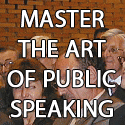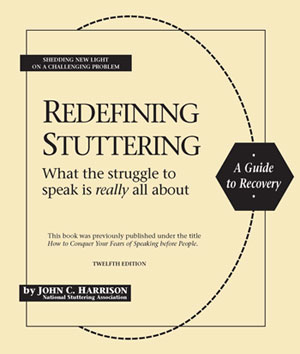Say the words “support group” to most people and you tend to get a negative reaction. “I don’t need a support group” or “no, I am not the support group sort of person” is generally the reply you will get. So for a person to attend a stuttering support group is a big step in any culture. We tend to have images of a group of people sitting around in a circle for an hour or two laying out their lives for everyone to discuss and get depressed about. But is a support group for people who stutter or stammer really like this.
In the main, people who have a marked speech disfluency, generally defined by other people as a stutter or stammer, tend to be well-adjusted individuals with great success stories in other parts of their life. They are generally very intelligent and very open and people who come from all walks of life. They just happen to share one thing in common and that is that they have a speech fluency issue. Oh, and they also share the fact that they are mostly exceptionally nice sensitive people.
So why would a person who stutters or stammers want to even consider joining a support group and why would one need support in the first place, “after all it is my problem and I can deal with it in my own way”. Let’s look first at why a person who stutters would need support.
Why do I need support?
There are 3 main reasons why:
1) The person who stutters has learned some form of fluency shaping method to try to control or eliminate their stuttering
2) The person who stutters has not learned some form of fluency shaping method (or no longer wishes to use what they have learned) to try to control or eliminate their stuttering but still seeks to control or eliminate their stutter
3) The person has no intention of changing how they speak but wants to learn to accept the disfluency by working on the psychological aspects of the problem
Let’s look at each one in turn.
1) All around the world, there are various forms of treatment for people who stutter. Most are treatments that address the physical symptoms of stuttering while some address the mental and emotional side of stuttering. Treatments that address the physical symptoms can be structured around short term visits to a clinician once per week to longer-term more structured treatments like the structure I outlined in my blog entry at Prolonged Speech – Stuttering Treatment’s Gold Standard. Whether it is a non-intensive or an intensive treatment program all forms of treatment see the individual suffer from a degree or relapse or regression from the positive results that are achieved from that treatment program. This relapse can range from a complete “fail to launch” where little is achieved to more of a “crash on re-entry” where spectacular results have been achieved only to see this disappear either quickly or over a period. Some of the reasons for relapse include non-acceptance of the stuttering control technique, general motivation, everyday surrounding environment, the level of the individual’s overall anxiety, and a tendency for the old innate speaking style and behaviour to re-remerge. It has been found that the best way to combat these forms of relapse is through the use of a stuttering/stammering support group. In this form of support group, individuals come together to support and learn from each other in their efforts to maintain the fluency that they are achieving from the particular fluency shaping technique that they have learned and decided to adopt. Such techniques would be Prolonged Speech (in its various forms) and McGuire Program to mention only a couple. Relapse, as mentioned, is the biggest problem facing stuttering treatments and the most little understood. Even the very dedicated and vigilant practitioners of a fluency shaping technique eventually lose contact with what is required to remain fluent and relapse. It has been shown that if they can come together with others who are trying to use such a technique to “regroup” in a support group environment and bring their fluency shaping skills back into the forefront of their mind, they can regain their fluency. Such support group meetings tend to be held either weekly or fortnightly and last for 2 – 3 hours. In such “support group meetings,” participants tend to come together to use the learned fluency shaping skills in a semi-intensive environment to reinstate the individual’s focus on the aspects of the “technique”. Apart from reinstating the stuttering control techniques, other activities in the support group involve practicing public speaking skills, debating as well as talking about the psychological aspects of dealing with stuttering and group members often offer comments and ideas on how they cope with the psychological aspects of stuttering. Participants often form very close and lifetime friendships of understanding and support. From time to time participants often organise mini one and two day technique “Boosters”.
2) In this form of support group individuals mainly come together to meet other people who stutter and to talk about dealing with the psychological aspects of having a stutter. In chatting about stuttering and meeting others who stutter the individual comes to learn that “I am not alone” as a person dealing with stuttering. As it is rare to see another person who stutters in society one tends to believe that they are unique in their disability and because of this belief the individual feels that they need to hide their stuttering as much as possible from the world, leading to avoidance, isolation and unfulfilled life opportunities. By coming together is a support group the individual comes to learn that there are many others who stutter. They get to see others with their issue and see that from a listener’s perspective stuttering is not as big a deal as they are making out themselves. By meeting regularly and chatting about stuttering they learn and share strategies from others about how to handle the speech block and also the associated social anxiety they face on a daily basis. In such a group they can practice in a safe and supportive environment how to better handle group conversations and impromptu presentations. The outcome of medium to long term regular attendance at such meetings is that the individual learns to better accept the level of stuttering that they have and so move toward the best answer for themselves which is not so much achieving total fluency but more so accepting their disfluency and in so doing turn their “stuttering problem” into just a “stutter” that no longer controls how they experience life.
3) We hear figures often stated that close to 1% of the population has a stutter but the fact of the matter is that most people who say they are a stutterer or are told that they stutter, are able to mostly hide it from the world through what are called avoidance strategies. Alternatively, they might have what would be termed a mild stutter but have some real self- defeating psychological problems that surround their experience of stuttering moments. Some have various levels of social phobia about the possibility of stuttering openly in front of other people that affects their experience of life even though their stuttering would for all intents and purposes be seen by others as mild. For people like this, attendance at a support group to work on their fear of stuttering can have a great positive effect on their meaning that they have given to their stuttering experiences
For most people who stutter, meeting and talking to others who share their common dilemma can be quite liberating to see that they are not alone and for many, the most liberating moment can come when they attend one of the many conferences organised by the many support groups around the world where one can meet new friends and invariably make long term friendships. I encourage all readers of this article to seek out others who stutter and share their experiences in a support group situation.
Comments:









{ 2 comments… read them below or add one }
a nice, heartbreaking knowledge, ready to move on and learn more. thanks
I totally agree, Jack…came across this blog a little late when I was searching around for discussions on support and the various reasons people seek support out. Thanks for sharing and looking forward to reading more posts
Sara
YouSpeak Stuttering Therapy